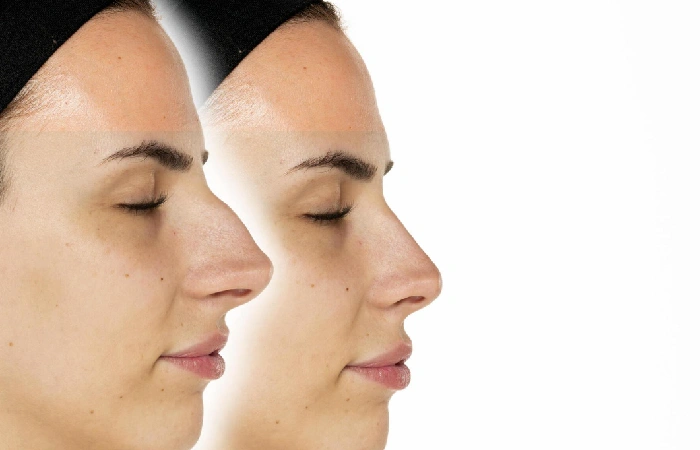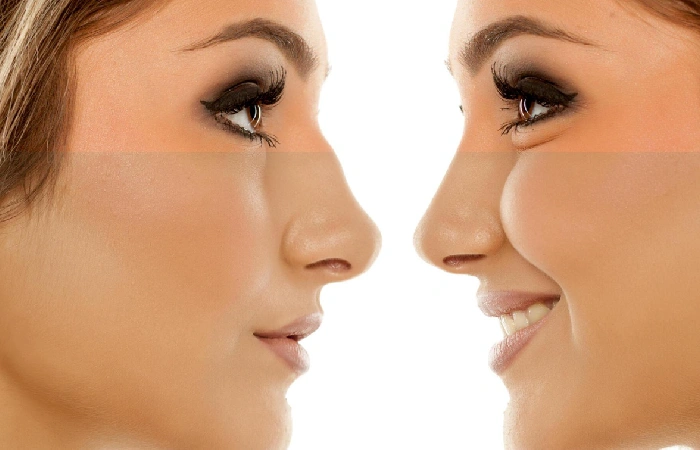“Rhinoplasty Transformation”, “How Long Does Rhinoplasty Take”, “Nose job London” – these phrases often come to mind when considering a nose job. Rhinoplasty is a popular cosmetic procedure that can transform your facial appearance and boost your self-confidence. However, having questions and concerns is normal before undergoing such a transformative surgery. In this comprehensive blog post, we will answer seven of the most common questions about rhinoplasty, providing valuable insights to help you make an informed decision about this life-changing procedure.
Table of Contents
Q1: What Is Rhinoplasty?

A1: Rhinoplasty, commonly known as a nose job, is a surgical procedure that focuses on reshaping the nose. Beyond cosmetic improvements, it can address various issues, including altering the size, shape, and symmetry of the nose, as well as functional concerns like breathing difficulties. The primary goal of rhinoplasty is to achieve a harmonious balance between the nose and other facial features.
Q2: How Long Does Rhinoplasty Take?
A2: The duration of a rhinoplasty procedure can vary depending on its complexity. It takes about 1 to 3 hours on average, but more intricate cases may require more time in the operating room. After assessing your specific needs and goals, your surgeon will provide a more precise estimate during your consultation.
Q3: What Is Rhinoplasty Transformation?\

A3: Rhinoplasty transformation refers to the remarkable changes that can occur after the procedure. Beyond physical alterations, it can enhance your facial harmony, improve your overall profile, and significantly boost your self-esteem. For many individuals, rhinoplasty can be a life-changing experience that improves their appearance, confidence, and quality of life.
Q4: Is Rhinoplasty Painful?
A4: Pain levels after rhinoplasty can vary from person to person. However, most patients report experiencing mild to moderate discomfort rather than severe pain. Your surgeon will provide detailed pain management guidelines to ensure your comfort during recovery. This typically includes prescribed medications to manage any discomfort effectively.
Q5: What Is the Recovery Like?

A5: Rhinoplasty recovery occurs in several stages. You can expect some swelling and bruising in the initial days following the surgery, particularly around the nose and eyes. Stitches and splints may be present, which will be removed during follow-up appointments as you progress through your recovery. It’s essential to be patient during this period, as it can take several weeks to months for the full results to become apparent. Your surgeon will provide specific post-operative care instructions to help facilitate a smooth and successful recovery.
Q6: Are There Risks Associated with Rhinoplasty?
A6: As with any surgical procedure, rhinoplasty does carry some inherent risks. These risks may include infection, bleeding, scarring, and in rare cases, the need for revision surgery. However, selecting a board-certified and experienced surgeon greatly minimizes these risks. Additionally, your surgeon will thoroughly discuss potential risks and benefits during your consultation, allowing you to make an informed decision about proceeding with the surgery.
Q7: Where Can I Get a Nose Job in London?
A7: If you’re considering a nose job in London, selecting a reputable and experienced surgeon or clinic is crucial. One such trusted option is this, a specialized clinic dedicated to rhinoplasty procedures. Their team of skilled surgeons is committed to helping you achieve your desired results while ensuring your safety and satisfaction. For more information and to schedule a consultation, visit their official website.
Q8: What Can Rhinoplasty Correct?
A8: Rhinoplasty is a versatile procedure that can address a wide range of concerns. It can correct the size of the nose, either reducing or increasing it to achieve a more balanced appearance. Additionally, rhinoplasty can reshape the tip and bridge of the nose, enhance symmetry, and address functional issues, such as improving breathing difficulties caused by structural abnormalities.
Q9: How Long Does Swelling Last After Rhinoplasty?
A9: Swelling is a common post-operative symptom after rhinoplasty. It typically peaks within the first week after surgery and gradually subsides over several weeks to months. While most visible swelling resolves within a few weeks, it’s important to note that it can take up to a year for the nose to settle fully and for the final results to become completely visible. Patience is key during the recovery process, and your surgeon will provide guidance on managing swelling.
Q10: What Should I Expect During a Rhinoplasty Consultation?
A10: During a rhinoplasty consultation, you can anticipate a thorough nose assessment and a detailed discussion of your goals and concerns. Your surgeon will explain the rhinoplasty procedure itself, potential risks, and expected outcomes. You’ll also have the opportunity to ask questions and express any specific desires or expectations you have for the surgery. Using this consultation to communicate openly with your surgeon to ensure a clear understanding of the procedure and to establish realistic expectations for the results.
Conclusion
Rhinoplasty, or a nose job, can be a life-changing procedure that enhances your facial appearance and boosts your self-confidence. In this blog post, we’ve answered seven common questions about rhinoplasty, providing valuable insights into the procedure. If you’re considering a nose job in London, rely on a reputable clinic with experienced surgeons dedicated to helping you achieve your rhinoplasty transformation. Don’t hesitate to visit their website to learn more and schedule a consultation. Your journey to a more confident you begins here.
